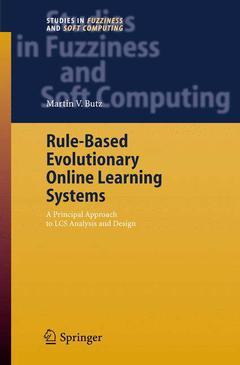Rule-Based Evolutionary Online Learning Systems, 2006 A Principled Approach to LCS Analysis and Design Studies in Fuzziness and Soft Computing Series, Vol. 191
Langue : Anglais
Auteur : Butz Martin V.

Rule-basedevolutionaryonlinelearningsystems,oftenreferredtoasMichig- style learning classi?er systems (LCSs), were proposed nearly thirty years ago (Holland, 1976; Holland, 1977) originally calling them cognitive systems. LCSs combine the strength of reinforcement learning with the generali- tion capabilities of genetic algorithms promising a ?exible, online general- ing, solely reinforcement dependent learning system. However, despite several initial successful applications of LCSs and their interesting relations with a- mal learning and cognition, understanding of the systems remained somewhat obscured. Questions concerning learning complexity or convergence remained unanswered. Performance in di?erent problem types, problem structures, c- ceptspaces,andhypothesisspacesstayednearlyunpredictable. Thisbookhas the following three major objectives: (1) to establish a facetwise theory - proachforLCSsthatpromotessystemanalysis,understanding,anddesign;(2) to analyze, evaluate, and enhance the XCS classi?er system (Wilson, 1995) by the means of the facetwise approach establishing a fundamental XCS learning theory; (3) to identify both the major advantages of an LCS-based learning approach as well as the most promising potential application areas. Achieving these three objectives leads to a rigorous understanding of LCS functioning that enables the successful application of LCSs to diverse problem types and problem domains. The quantitative analysis of XCS shows that the inter- tive, evolutionary-based online learning mechanism works machine learning competitively yielding a low-order polynomial learning complexity. Moreover, the facetwise analysis approach facilitates the successful design of more - vanced LCSs including Holland?s originally envisioned cognitivesystems. Martin V.
Prerequisites.- Simple Learning Classifier Systems.- The XCS Classifier System.- How XCS Works: Ensuring Effective Evolutionary Pressures.- When XCS Works: Towards Computational Complexity.- Effective XCS Search: Building Block Processing.- XCS in Binary Classification Problems.- XCS in Multi-Valued Problems.- XCS in Reinforcement Learning Problems.- Facetwise LCS Design.- Towards Cognitive Learning Classifier Systems.- Summary and Conclusions.
Provides a comprehensive introduction to Learning Classifiers Systems Principle approach to understand, analyze, and design Learning Classifier Systems Includes supplementary material: sn.pub/extras
Date de parution : 11-2005
Ouvrage de 259 p.
21x29.7 cm
Thèmes de Rule-Based Evolutionary Online Learning Systems :
© 2024 LAVOISIER S.A.S.


